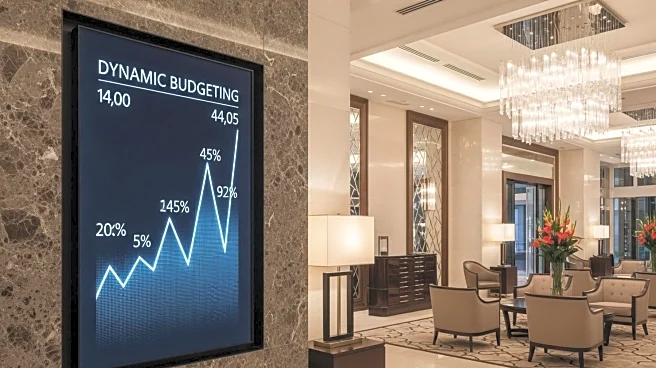What's Happening?
Hotels are reevaluating their marketing strategies by adopting 'Dynamic Budgeting' to enhance visibility and guest loyalty through direct channels. This approach shifts focus from comparing OTA commission costs to direct booking acquisition costs, emphasizing the strategic importance of brand identity and guest data ownership. The direct channel is seen as a foundational element where hotels can maintain control over communication and relationships with guests. Dynamic Budgeting encourages hotels to invest proportionally and strategically in visibility across the guest journey, rather than relying heavily on OTAs, which are technology companies with incomparable marketing budgets. This method aims to reclaim guest relationships and foster loyalty through unique experiences rather than transactional interactions.
Why It's Important?
The adoption of Dynamic Budgeting is significant for the hospitality industry as it addresses the dependency on OTAs for visibility and bookings. By focusing on direct channels, hotels can build stronger brand identities and cultivate long-term guest relationships, which are crucial for sustainable growth. This strategy allows hotels to invest in marketing that aligns with their lifecycle stage, potentially reducing costs over time while enhancing guest loyalty. The shift from a transactional to a relational approach in guest acquisition can lead to increased repeat business and advocacy, ultimately benefiting the hotel's reputation and profitability. It also challenges the traditional metrics used to evaluate marketing efficiency, promoting a more holistic view of investment in guest experience.
What's Next?
Hotels implementing Dynamic Budgeting may see changes in their marketing strategies, with increased investment in storytelling and technology to enhance guest experiences. As hotels focus on reclaiming guest relationships, they might develop new loyalty programs and personalized communication strategies. The industry could witness a shift in KPIs, prioritizing guest ownership and long-term relationship value over immediate occupancy rates. This approach may also lead to a reevaluation of partnerships with OTAs, balancing their role as intermediaries while strengthening direct booking channels. Hotels may need to train staff to better engage with guests and leverage data to personalize services, ensuring that the guest experience remains central to their business model.
Beyond the Headlines
Dynamic Budgeting introduces a paradigm shift in how hotels perceive marketing investments, emphasizing the importance of narrative ownership and guest experience. This approach challenges the traditional reliance on OTAs, which often leads to higher cancellations and diluted brand identity. By focusing on direct channels, hotels can create distinctive narratives that resonate with guests, fostering loyalty that transcends mere transactions. This strategy also highlights the ethical dimension of guest ownership, as hotels seek to reclaim relationships that are rightfully theirs. The long-term impact could redefine the competitive landscape in hospitality, with hotels that successfully implement Dynamic Budgeting gaining a strategic advantage in guest retention and brand differentiation.









